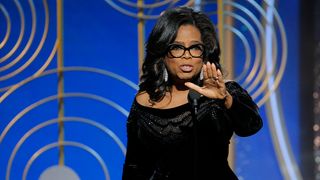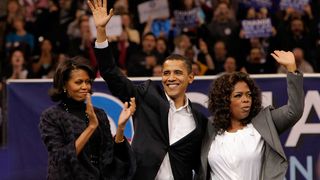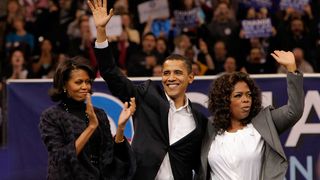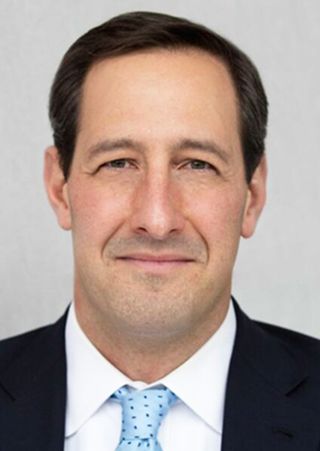Could a Trump presidency simply be the forerunner of an Oprah presidency? After Oprah Winfrey's inspiring speech at the Golden Globe Awards that perfectly captured the righteous anger of the #Metoo movement, she is suddenly being tipped a potential presidential candidate for 2020. Her speech has gone viral, the hashtag #Oprah2020 has gained a following on social media, The New York Times, Washington Post, and Politico all weighed in on the prospects of an Oprah presidential run, and her longtime partner Stedman Graham told the Los Angeles Times that it was "up to the people. She would absolutely do it". Actress Meryl Streep was less circumspect, declaring after the speech that Winfrey "doesn't have a choice", and adding that "I want her to run for president".
In a sense, presidents are America's top celebrity and almost everything they do is news. This pattern goes back to the very beginning of American history.
None withstanding Streep, across the political spectrum American political analysts, pundits, and operatives think Oprah would make a formidable candidate with a decent chance of capturing the Democratic Party's nomination in 2020 and unseating Trump.
Winfrey's serious and important message has earned well-deserved attention. But her status, wealth, her uplifting message, and above all her celebrity status make a presidential candidacy sound far from implausible.
Of course, Winfrey is hardly the only celebrity whose name has surfaced as a potential presidential candidate, even if most observers agree that she would be the most credible. Businessman and TV personality Mark Cuban, actor Dwayne "The Rock" Johnson, rapper Kanye West, and first-daughter Ivanka Trump have all speculated about a run for the White House.

The ancient historian Livy believed that the Roman Empire's demise could be dated to the moment when chefs became celebrities. If he were in Washington today, what might he say about the moment when celebrities became US presidents.
First of all, celebrity and the US presidency have always been intermingled. Ronald Reagan was an actor; John F. Kennedy personified the cool style of the early 60s; Franklin Roosevelt had the most recognised voice in America in the 1940s; "Teddy Bears" were named after his cousin Teddy Roosevelt, whose exploits helped create the image of the presidential "bully pulpit", that sat at the centre of American political life. In a sense, presidents are America's top celebrity and almost everything they do is news. This pattern goes back to the very beginning of American history. George Washington was the single most recognisable name in America at its founding. This accounted, in no small part, for his elevation to the presidency.
Capturing the nation's imagination has always been an asset to presidential contenders. It has granted them instant name recognition, an ability to excite and mobilise the electorate, and the capability to pull in dollars for the long and expensive presidential campaigns.
As a Republican political adviser noted in the wake of Oprah's speech, "are we really asking ourselves whether a political neophyte, billionaire, media-savvy TV star can become president? America answered that already."
Ronald Reagan, who spent the first half of his career honing his communication and acting skills in Hollywood and on the radio, perfected the role of playing president. Asked how being an actor had prepared him for the rigors of the White House, he quipped "how can a president not be an actor?" Of course, not all celebrities are created alike. Even Reagan, who had the appearance of a lightweight, had spent years honing his political philosophy, broadcasting his views on hundreds of discreet political issues, and serving as California's governor.
With the exception of Donald Trump, all American presidents have had prior political experience at the congressional, state, or senior military level. In fact, celebrity status without comparable gravitas was long deemed a disqualifier for the presidency. In 2008 John McCain ran a presidential campaign ad against Barack Obama criticising him on these grounds. But that was then; this is now. As a Republican political adviser noted in the wake of Oprah's speech, "are we really asking ourselves whether a political neophyte, billionaire, media-savvy TV star can become president? America answered that already." While Trump stands out as the only president to occupy the office bereft of prior governing experience, it is not so easy to dismiss the notion that his presidency is a one-off.

Quite apart from the ongoing investigation into charges of obstruction of justice and collusion with the Kremlin, a large part of the answer to that question depends on whether, and how quickly, American voters tire of Trump. If his political standing continues descending through the 2018 congressional elections, it will become clear that Trump gave voice to the grievances of a large group of Americans without being able to lead a political realignment or govern competently.
But before concluding that 2020 will see Oprah Winfrey moving into 1600 Pennsylvania Avenue, much depends on what happens over the next three years. The 2018 congressional elections are important indicators of the national mood. And of course much will depend on who runs in 2020; whether Trump prompts a primary challenger, if Democrats respond to Trump by moving further left or tacking to the centre, and how crowded their primary is.
And if America ends up in a Constitutional crisis or the world is tested by a real crisis before then, the clamour for experience, expertise, and steadiness will grow. Bigly, as Trump would say.




